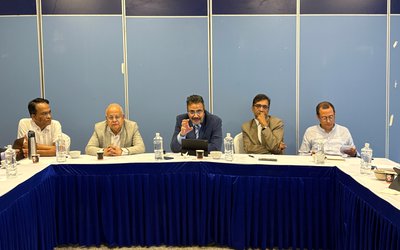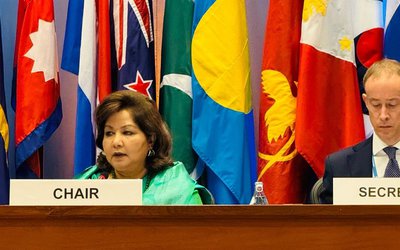More on National






Notwithstanding the controversies surrounding his hasty visit to Nepal, Shyam Saran had the ears of prime minister Man Mohan Singh became clear when the latter banked on the diplomat’s reports to brief a main opposition Bharatiya Janata Party delegation on Nepal crisis.
Emerging from the meeting with Singh, the BJP leader Vijay Jolly warned against the installation of a Maoist-led government in Nepal.
That was a big boost to the Congress-led coalition government it Delhi which has been going out of its way to ensure that a non-Maoist led government was put in place in Kathmandu.
It was with that purpose that Shyam Saran came to Nepal after the Maoists nearly pulled off a coup of sort by luring the MPS of the “pro-Indian” Terai outfits to vote for Prachanda in the third round of elections.
The fourth round was, expectedly, inconclusive. And the fifth round looked to meet the same fate, one day before the voting.
But the Maoists were not out of the race yet. The cozying up to the Maoist-friendly UML boss Jhalnath Khanal had every chance of threatening to disrupt Delhi’s calculations.
Delhi was perhaps aware of it. This explains Saran’s parleys with unexpected quarters, in Kathmandu.
On arrival, he told reporters at the airport that he was here as envoy of prime minister Man Mohan Singh to help facilitate consensus and ward off concerns over Nepal’s peace process, stability and constitution were at peril.
What he did soon after was to see the outgoing prime minister Madhav Kumar Nepal who, having been reduced to a caretaker head of government, has no authority whatsoever to contribute to the cause of stability and peace process.
The next man on Saran’s list was the figurehead president Ram Baran Yadav who “boldly” stepped in to foil the then prime minister Prachanda’s bid to replace the Nepali army chief.
The every busy envoy, engaged in countless meetings with top leaders of three big parties, the four Terai-based regional parties and two editors and a TV talk show host, just to mention a few, spared time to see the executive powerless president again before leaving for Delhi.
In between, he quietly met the chief of the Maoists’ bête noire body, the 90000 strong Nepali army, Chhatra Man Singh Gurung
Gurung wanted it to be strictly “private” affair, but the information on one-to-one meeting got leaked out.
According to discerning analysts, it is these meeting that will matter the most in the days to come no matter how the prime minister’s election drama unfolds.
Whether Saran’s Nepal mission turns out to a success, from India’s point of view, will largely depend on how much the southern neighbour has taken the northern giant, China, into confidence.
The growing Western presence in their Himalayan backyards is a concern both India and China do share.
That common concern will shape the destiny of Nepal. Not the “sovereign” Nepali voters least of all the toothless constituent assembly.








